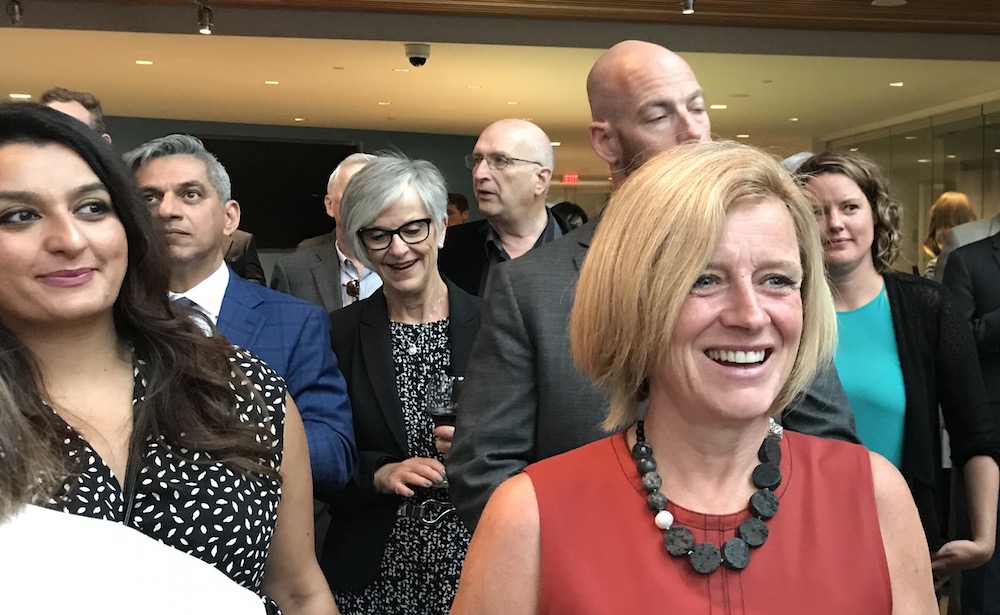U.S. President Donald Trump may not actually have intended to deliver a setback to West Coast environmentalists opposed to the completion of the Trans Mountain Pipeline expansion project, but he has done so with his recent dubious allegations about Canada’s trading practices.
Building a pipeline capable of carrying diluted bitumen from Alberta to Vancouver Harbour, where it is claimed it will fetch a better price from Asian buyers than American ones on the Gulf Coast, may not make much difference for the national economy in the event the Trump administration places huge tariffs on Canadian-built automobiles, for example.
But it certainly strengthens the argument in the minds of many members of the public that Canada must complete the now federalized Trans Mountain project and perhaps build more new pipelines — whether coastal British Columbians like it or not — to diversify its economy.
Alberta New Democratic Party Premier Rachel Notley was certainly not shy about making that point, telling visitors to a Calgary petroleum trade show this week that President Trump’s “reckless attacks on our steel and aluminum industries and … the hard-working people that those industries employ” shows the need for the pipeline.
“I have a message to send to folks beyond this room, to British Columbia and to all Canadians,” she told the conference goers. “If the last days and weeks tell us anything, it’s that we, as Canadians, need to take control of our economic destiny.”
She made the same points again last night to a gathering of the party faithful in Edmonton — using President Trump as her straight man to sell her pipeline vision.
“Just so we’re all up to date where things stand in the world, Canada is a very hostile country” (pause for laughs) “and the North Korean regime is very loving. Canada is very greedy, duplicitous, backstabbing; while Russia should be welcomed with open arms to the G7 table. And our dairy farmers? They’re a major, major threat to U.S. security!”
Remember how Americans abroad used to stitch Canadian flags on their knapsacks, she asked. “Just recently we’re hearing stories of bald eagles” (beat, beat) “dressing up like Canadian geese. Yeah, that happened!”
All joking aside, Notley made her point to the friendlies in the same language as she made it to the oil industry: “As Canadians we need to take control of our economic destiny. We simply cannot put all our eggs in one basket. We must diversify our markets” — and that means, she asserted, building that pipeline.
Count on it, you’re going to be hearing these lines a lot in the weeks ahead.
Meanwhile, for those who support the time-tested, traditional methods of managing Alberta’s economy and keeping its budgets in balance, it’s starting to look as if the power of prayer may be coming through for Alberta one more time.
The traditional economic policy of Alberta governments back to Social Credit, of course, has been to keep taxes too low to pay for what we have to do, keep services relatively high to please voters, and pray for an increase in royalty revenue.
Now there are indications God may have answered Albertans’ prayers for another oil boom, with or without a bumper-sticker promise that this time we don’t hose it all away again, or words to that effect.
It must make the blood of Jason Kenney’s strategic brain trust over at United Conservative Party HQ run cold to see world oil prices creeping back up to a point where commentators can blithely speculate they could soon push Alberta’s account books back into the black, maybe even in time for the next provincial election, expected in 2019.
West Texas Intermediate, the North American benchmark price, has eased back upward to US$65 per barrel, almost 50 per cent higher than it was at this time last year.
Count on it, if this keeps up, there is bound to a disconcerting pivot in the UCP’s propaganda coming soon. To wit: That while the worldwide drop in the price of oil that impacted Alberta’s budget was entirely the fault of the NDP and its policies, any positive effect from the worldwide increase in prices we are seeing now could have nothing whatsoever to do with local management of the economy.
This post also appears on David Climenhaga’s blog, AlbertaPolitics.ca.
Photo: David J. Climenhaga




